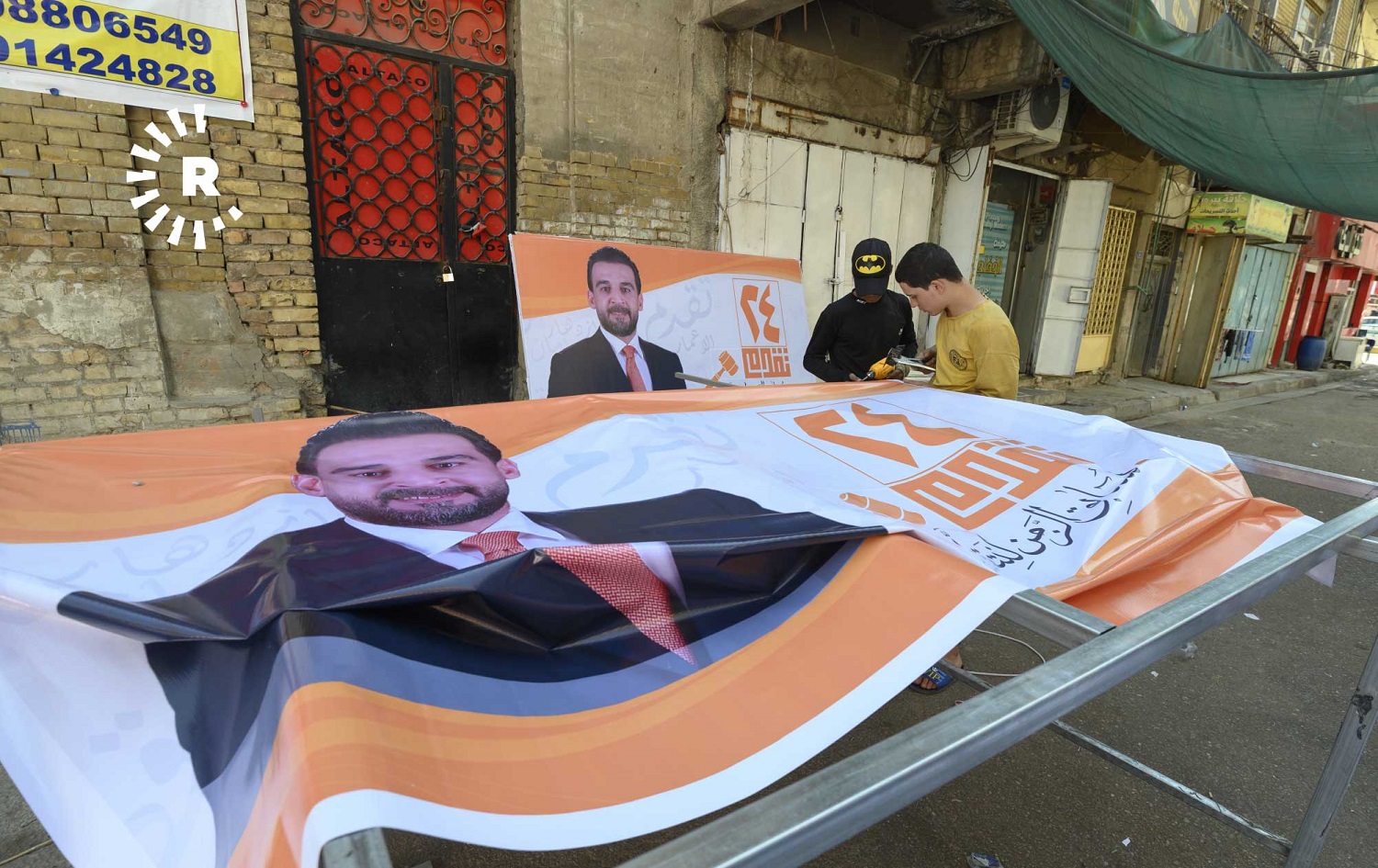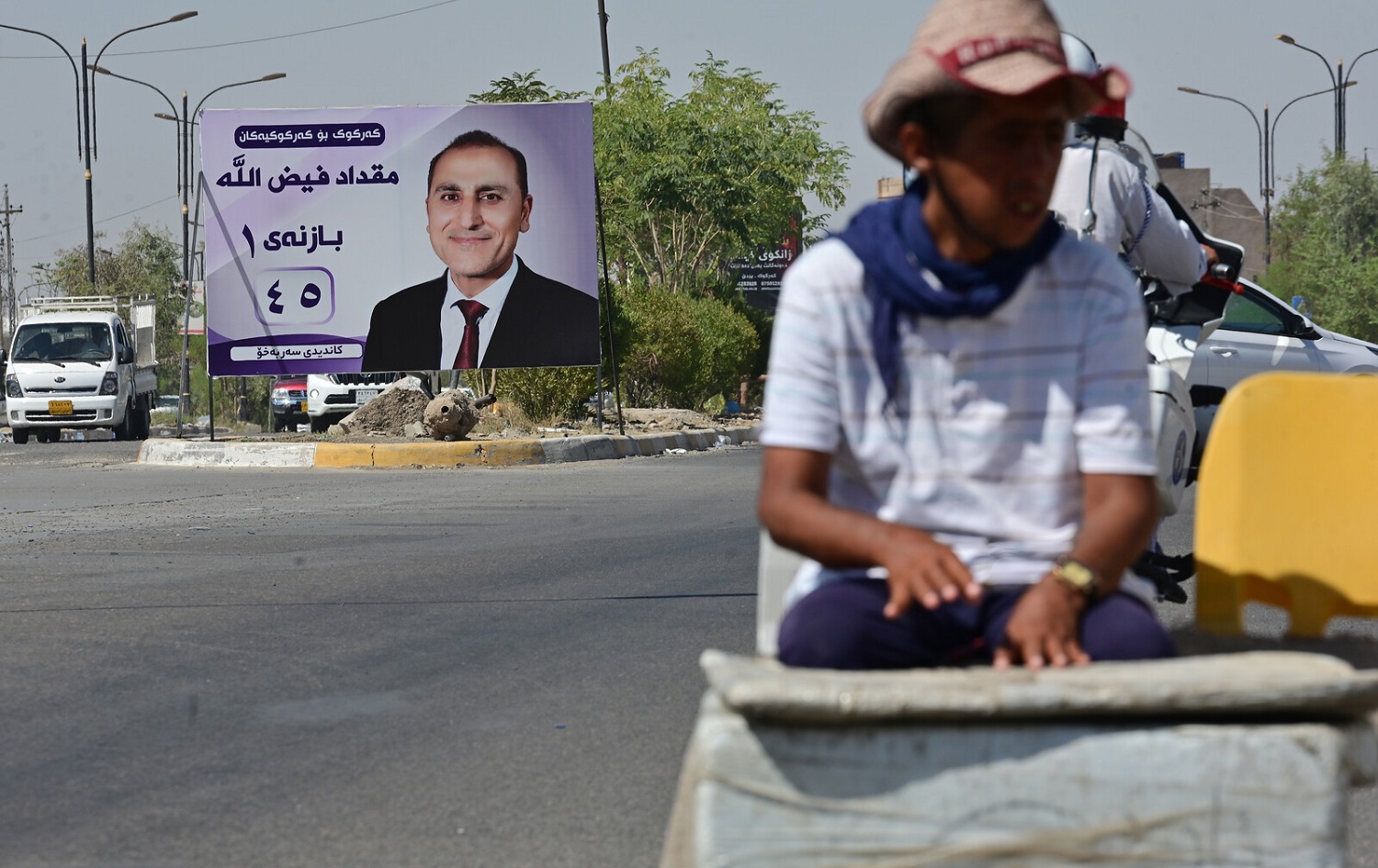
A man walks past a mural in Baghdad urging people to vote in Iraq's October 10 parliamentary election, on September 20, 2021. Photo: Bilind T. Abdullah/Rudaw
Despite government efforts, public skepticism is high on a range of factors: vote buying, electronic voting, influence of militias, and bad memories from the 2018 election when the formation of the new government was delayed for months because of accusations of vote rigging.
Reports of people attempting to sell their votes, sometimes even their biometric voter cards, and candidates willing to buy them have been a daily occurrence in Iraq for the past month. Security forces have announced the seizure of illegal voter cards. The electoral commission on Thursday announced their decision to cancel the endorsement of the candidacy of Ashwaq Fahed Aboud al-Ghurairi because there is a criminal case against her on charges of buying votes.
The voter cards are biometric, requiring thumbprint verification, but this has not prevented people from selling the cards.
“Every election cycle, these problems increase,” Imad Jamil, from the Independent High Electoral Commission’s (IHEC) media department, told Rudaw’s Hawraz Gulpi on Sunday. “When the commission tightened its security measures at polling stations and some realized they cannot alter the results from within, they went to buy these cards to use on election day, thinking they will work without their owner.”
“When they realized that this does not work without the owner's fingerprints, they went from trying to vote instead of people, to having the voter vote and take a picture of their votes in the booth. But the commission stopped this attempt too as the security forces banned taking phones into the [polling] stations,” he added.
Head of the United Nations mission in Iraq (UNAMI) Jeanine Hennis-Plasschaert earlier this month told media that additional measures have been taken to avoid fraud in the elections, among them confiscating all voter cards after use and disabling them for 72 hours. Older voter cards have been collected and destroyed.
Iraq elections: Nearly 4.7 million voter cards printed before 2014 and 2018 elections but never picked up by registered voters are being destroyed to prevent electoral fraud - UNAMI
— Rudaw English (@RudawEnglish) September 10, 2021
📸: UNAMI/Facebook pic.twitter.com/MvX36jQ8vb
President Barham Salih in June suggested election results be announced within 24 hours, aided by the electronic voting system. However this system caused problems in 2018.
In that election, thousands of votes were annulled after suspicion of the servers counting the votes led the parliament to order a partial manual recount. The results were delayed for around three months and the government of former Prime Minister Adil Abdul-Mahdi was sworn in five months after the vote.
Suspicions about the electronic system remain, especially that it may be exposed to international cyber threats. The IHEC’s Jamil said the servers are all operating from within Iraq and so should be protected.
‘Strict security measures’
A year after the government of Abdul-Mahdi was sworn in, thousands of Iraqi youth flooded the streets in anti-government protests. Top of their list of demands was early elections - a vote fair and free of fraud. The protests were met with violence and hundreds of the demonstrators did not live to see the elections that were called by Prime Minister Mustafa al-Kadhimi when he assumed office in May 2020, replacing Abdul-Mahdi who stepped down. The government also amended the electoral law.
Kadhimi, who is not running in the election, has said the goal is a vote that is fair, “reflecting the aspiration of Iraqis to a better future and results that truly reflect the will of the Iraqi people.”
Earlier this month, he called on security forces to deal with parties and candidates accused of threatening people into voting for them.
“We have received many complaints from some regions, about some entities and parties threatening citizens to bring all their families' cards and vote for them. The security services should deal with these complaints firmly and forcefully,” he said. “There are some groups trying to blackmail voters, influence their voting decision by force, and trying to bypass the state and the law.”
“Strict security measures have been put in place to prevent any case of infiltration or fraud attempts,” Kadhimi added.

An election security plan was devised by the Ministry of Defence, Ministry of Interior, intelligence forces, and national security forces, spokesperson for Iraq’s Joint Operations Command Major General Tahsin al-Khafaji told Rudaw’s Hawraz Gulpi on Tuesday. The counter-terrorism forces and militias of the Popular Mobilization Forces (PMF) are not part of the plan, but are being held in reserve if needed.
They have also created a team of security forces who will collect and transport ballot boxes, bringing them to a secure location with strictly limited access. “The place where the boxes will be placed is a purely security site, that can be accessed by authorized security personnel,” Khafaji explained.
International monitoring
As an added layer of security, the election will take place under close international observation, perhaps among the strongest cards the government is using to motivate people to vote.
“We have also coordinated an international presence to give a higher legitimacy to the elections,” said Kadhimi.
The UNAMI chief earlier this month said that a group of 130 international experts and around 600 supporting staff will be monitoring the elections for the United Nations. The IHEC on September 14 formed four committees, each including a consultant from UNAMI, tasked with reviewing complaints filed during the campaign in their assigned provinces.
A second observing team of 80 people from the European Union is also observing preparations ahead of the vote and election day.
This is the first time the EU has deployed an election observation mission in Iraq, the head of the mission Viola von Cramon told media last Thursday, explaining their mandate “is to observe all aspects of the electoral process and to assess the extent to which these elections comply with international and regional commitments for elections as well with Iraqi law.”
“In my meetings I was assured that the preparations for the elections are well under way and all efforts are being undertaken to ensure the integrity of the polls, the safety of voters, poll workers and all citizens on election day and beyond,” von Cramon said in a press release on Sunday. “Security is a crucial factor. Voters must have the confidence that they can vote freely and safely for the candidate of their choice and that their vote makes a difference.”
She added that their team will conduct a “comprehensive analysis” of the electoral process ahead of, during, and after election day.
Disputed areas
Election security in the disputed territories is a particular concern. These areas are claimed by the governments in both Erbil and Baghdad. They are ethnically diverse and tensions between different groups are high in some areas. The dispute also creates a large security vacuum where Islamic State (ISIS) remnants remain active and pose a serious threat.
In a meeting with the EU’s von Cramon, Kurdistan Region Prime Minister Masrour Barzani hoped for a fraud and violence-free election “especially in the disputed territories.”
The Peshmerga are working with Iraqi forces to improve security. “We have four coordination centers and two main centers in those areas,” Secretary-General of the Ministry of Peshmerga Jabar Yawar told Rudaw on Monday. “We have tried to set up strategies for areas that pose a danger, especially during elections, and for Peshmerga forces to be able to coordinate with the Iraqi forces to protect areas outside the polling stations.”
The most hotly disputed part of the disputed areas is Kirkuk. In previous elections, Kurdish parties have secured a majority of votes. This year, there are accusations that the Kurds are trying to alter the elections.
Three members of the Iraqi parliament representing Arab and Turkmen communities in Kirkuk city called for a week postponement of the election in the city. They accused the election commission’s provincial office of discriminating against both Arab and Turkmen parties and stacking the elections in favour of Kurds, which they claimed happened in the previous election.

Kurdish parties on the other hand have claimed that Arab and Turkmen parties, some supported by the PMF militia network, have vandalized their election posters and prevented their candidates from holding campaign events.
"I think part of the responsibility lies with the authorities of this city. The way the posters are torn down is more like revenge [against Kurds] because they are mostly removing the heads of the candidates," Ali Qalaiy, head of the Patriotic Union of Kurdistan (PUK) elections office in Kirkuk, told Rudaw last week.
Kirkuk is not the only disputed territory that has been home for problems between the ethnic groups. The Kurdistan Coalition between the PUK and Gorran recently said they are being prevented from running election campaigns in Diyala.
“Some forces and parties in districts of Saadiya, Jalawla and other areas around Diyala governorate are preventing Kurdish candidates from running their electoral campaigns for the upcoming Iraqi elections," spokesperson for the coalition in Diyala Abbas Mahmoud told the PUK’s official media on Sunday. All Kurdish candidates, not just their own coalition, are facing the same problems, he added.
Is it enough?
There are a total of 3,249 candidates, including 951 women, competing for 329 seats in the parliament. Nine seats are reserved by minorities and there are 67 candidates vying for these spots. At least 25 million Iraqis are eligible to vote, but polls predict a record low turnout.
Political analyst Arif Qurbany said not a lot has changed compared to previous votes. Ahead of every election much is said about eliminating fraud and international observers are invited, “but we have always seen that elections in Iraq have never been clean and fair,” he told Rudaw English.
The electoral system has changed, but the mindset driving Iraqi politics has not, he said. “As a result, fewer people will turnout for the election, either because they do not trust it or have reached a point where they believe that elections will not change anything in the equation,” he said.
Iraqi President Barham Salih called on people to get out and vote in an interview with Al-Jazeera last week. “The elections are an opportunity for Iraqis, and the alternative to that is chaos. The elections need to be clean and express the people's free will, in order to produce a capable, effective government that expresses the will of the Iraqis and works to harness the country's resources to serve them,” he said.









Comments
Rudaw moderates all comments submitted on our website. We welcome comments which are relevant to the article and encourage further discussion about the issues that matter to you. We also welcome constructive criticism about Rudaw.
To be approved for publication, however, your comments must meet our community guidelines.
We will not tolerate the following: profanity, threats, personal attacks, vulgarity, abuse (such as sexism, racism, homophobia or xenophobia), or commercial or personal promotion.
Comments that do not meet our guidelines will be rejected. Comments are not edited – they are either approved or rejected.
Post a comment